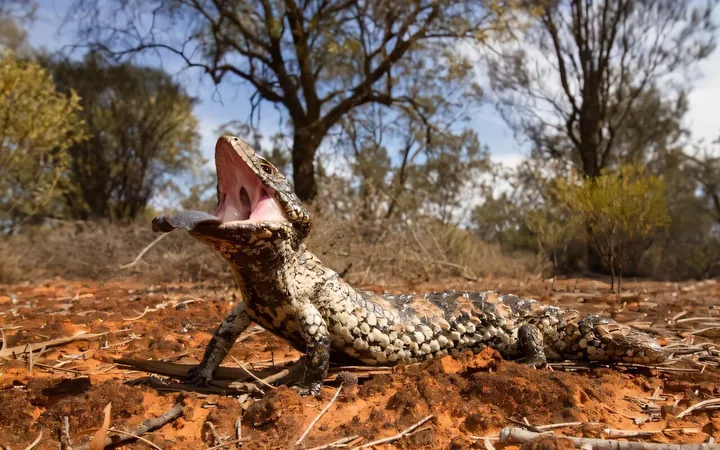
Lizards vs. Flames: How Aussie Reptiles Evolved to Smell Smoke
2025-09-16
Author: Wei
Australian Lizards Outsmart Fire with Their Nose
In an intriguing discovery, Australian researchers have found that sleepy lizards (Tiliqua rugosus) can identify the scent of smoke—an early warning signal of fire—and make swift attempts to escape. However, they remain indifferent to the crackling sounds of flames.
A Surprising Experiment
Published in the journal *Biology Letters*, the study sheds light on a quirky observation made by zookeepers at a U.S. zoo. When a staff member accidentally burned lunch, it triggered a chain reaction among the captive sleepy lizards, who became noticeably agitated by the pungent smoke. In stark contrast, other reptiles in the vicinity remained unfazed. Even though these lizards were primarily bred in captivity, researchers found their frantic tongue-flicking and pacing to be innate behaviors rather than learned responses.
The Evolutionary Advantage
Lead author Dr. Chris Jolly from Macquarie University commented, "Many animals in fire-prone areas, like Australia, have developed remarkable skills to survive raging fires. Our study shows that certain lizards instinctively recognize smoke as a harbinger of danger and react by fleeing." With climate change intensifying wildfires, grasping how wildlife navigates these threats is pivotal.
A New Look at Survival Strategies
Contrary to popular belief, many species have evolved unique strategies to detect and evade fire. This research emphasizes how habitats subjected to frequent wildfires have influenced the sensory systems and behaviors of animals like sleepy lizards. Instead of responding to the crackling flames, these lizards are finely tuned to recognize smoke.
Why This Matters Now More Than Ever
As wildfires increase in frequency and severity, even invading regions previously untouched by flames, Dr. Jolly underscores the urgent need for greater awareness. "We must identify which species are agile enough to respond to fire signals and which are at greater risk of extinction," he says.
The Experiment's Key Findings
In an experimental setup, researchers presented sleepy lizards with smoke alongside the sound of fire, using appropriate control measures. The lizards reacted significantly to the smoke, darting away, while they exhibited no discernible response to sound, indicating their instinct is closely linked to olfactory cues.
A Call to Action in a Changing Climate
This research serves as a crucial reminder to explore animal survival tactics amid the escalating threat of wildfires around the globe. With destructive fires on the rise and biodiversity hanging in the balance, understanding these evolutionary adaptations has never been more urgent.





 Brasil (PT)
Brasil (PT)
 Canada (EN)
Canada (EN)
 Chile (ES)
Chile (ES)
 Česko (CS)
Česko (CS)
 대한민국 (KO)
대한민국 (KO)
 España (ES)
España (ES)
 France (FR)
France (FR)
 Hong Kong (EN)
Hong Kong (EN)
 Italia (IT)
Italia (IT)
 日本 (JA)
日本 (JA)
 Magyarország (HU)
Magyarország (HU)
 Norge (NO)
Norge (NO)
 Polska (PL)
Polska (PL)
 Schweiz (DE)
Schweiz (DE)
 Singapore (EN)
Singapore (EN)
 Sverige (SV)
Sverige (SV)
 Suomi (FI)
Suomi (FI)
 Türkiye (TR)
Türkiye (TR)
 الإمارات العربية المتحدة (AR)
الإمارات العربية المتحدة (AR)